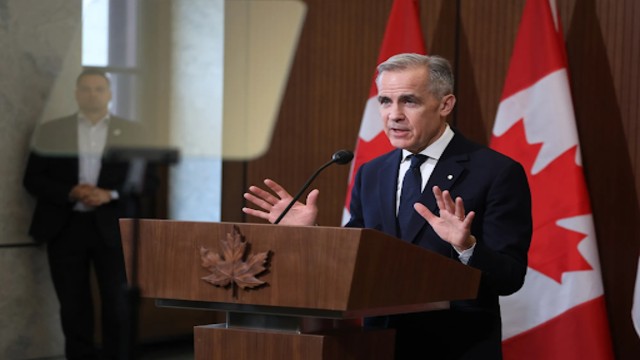
Mark Carney, the prime minister of Canada. Bllomberg
Prime Minister Mark Carney is putting his election campaign on hold for the third time. He is stepping away from campaigning to deal with the growing trade fight started by U.S. President Donald Trump. Carney, who is leading the Liberal Party in the current federal election, will return to Ottawa to meet with key cabinet and security officials. This meeting will focus on Canada-U.S. trade issues and national safety.
Trump recently paused his new tariff plan for 90 days, which affects several countries. However, Canada is not on the list of countries getting this temporary break. Despite the pause, Canada is still dealing with other tariffs. These include a 25% U.S. tariff on non-CUSMA goods, and similar tariffs on steel, aluminum, and auto parts.
Trump’s new plan introduces a 10% base tariff for most countries, except for China. China now faces a very high 125% tax on goods sent to the U.S. because of its response to earlier U.S. tariffs. A White House official confirmed that Canada and Mexico are still exempt from this new 10% base tariff. But if the U.S. removes fentanyl-related tariffs, Canada and Mexico could face a 12% tariff instead.
Carney called Trump’s pause a “welcome reprieve for the global economy.” But he also warned that other tariffs and possible new ones are already hurting people in Canada and around the world. “The stakes have never been higher for our economy,” Carney said during a campaign stop in Brampton, Ontario.
He confirmed that he spoke to Trump for the first time since becoming prime minister. Carney said that if he wins the election, he will start trade talks with the U.S. right after. “We will make sure these talks are fair while defending our workers and building our economy,” he added.
Carney also spoke with the President of the European Commission, Ursula von der Leyen. They talked about the U.S. tariffs and agreed to work closely to improve economic ties and protect financial security on both sides of the Atlantic. Von der Leyen said the EU would wait 90 days before adding tariffs of its own. But she warned that if talks do not go well, the EU will respond with countermeasures.
Carney said it was no accident that he reached out to European leaders. He stressed the importance of stronger trade with Europe, the UK, and Asian partners.
The trade dispute has now become a major issue in the Canadian federal election. Carney had already paused his campaign twice before—once after Trump signed the auto tariff order and again after the April 2 announcement of “reciprocal” tariffs.
Other party leaders are also reacting. Conservative Leader Pierre Poilievre strongly criticized Trump for not including Canada in the 90-day pause. He called it “a historic mistreatment” and asked why Canada was being treated worse than many distant countries. “It remains a mystery,” he said while campaigning in Milton, Ontario.
Meanwhile, NDP Leader Jagmeet Singh, speaking in Saskatoon, said many Canadians feel stressed about the trade war and Trump’s unpredictable actions. He said his party would not cut government services during this uncertain time. “We think cutting the services people need is the wrong thing to do,” Singh said.















